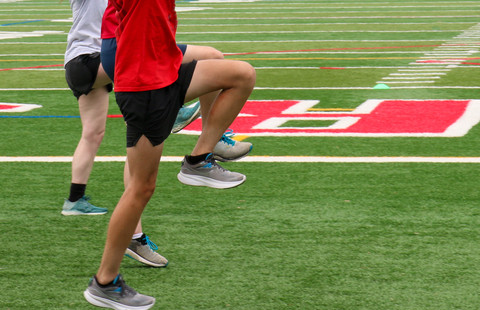Basketball, Pickleball, Strength And Conditioning, Taekwondo, Tennis, Volleyball
Welcome and thanks for visiting...

Why Warming up Before Playing Is So Essential

Athletes in every sport always hear their coaches stress the importance of warming up. Warmups serve a few simple purposes — to reduce the risk of injury, improve your performance and increase career longevity. How do they accomplish all these things? Let’s explore why warming up before playing is so essential.
Lower Risk of Injury
Lower risk of injury is the most practical benefit of warming up before playing any sport. You need to prepare your body for strenuous activities. Although there’s a surprisingly limited amount of clinical evidence, several studies have shown that a dynamic warmup routine reduces an athlete’s injury risk before exercise.
Warming up helps with injury prevention in many ways:
- It increases blood flow to the targeted muscles.
- It raises your body temperature, improving muscle elasticity.
- It raises each muscle’s temperature, reducing the risk of strains and tears.
- It activates your body’s cooling mechanisms to prevent overheating.
- It dilates your blood vessels, reducing the strain on your heart despite its increased rate.
- It helps you focus on the task ahead, specifically preventing traumatic injuries caused by simple human error.
Your warmup needs to check a few boxes to reap all these benefits. First, it must include dynamic movements. Static stretching alone is not sufficient enough to warm up your muscles. You need to add more advanced fast-twitch activities to loosen your muscles, increase your heart rate and get your body into exercise mode.
The warmup should closely correspond with the subsequent sport or exercise. For example, basketball players' movements should translate to the court. Running, jumping and footwork drills are the most effective for this situation.
Your warmup must have an appropriate duration and intensity. A long, exhausting session can backfire and increase your injury risk, but a short, low-intensity warmup prepares your body for the stressful activity without causing excessive fatigue. It only takes 10 minutes to increase your heart rate and muscle temperature sufficiently.
Improved Performance
Warming up also helps maximize your performance for many of the same reasons, such as preventing injuries. The two most influential factors are increased blood flow and muscle temperature because of their full-body effects. The same prerequisites apply as before — your warmup routine must include relevant dynamic movements at an appropriate time and intensity.
The mental factor is also huge. Nobody can jump into a fast-paced competitive environment without a warmup and expect to perform well. You need time to mentally prepare. Warming up before playing gives you a brief moment to collect your thoughts and focus on the task at hand. Athletes often listen to music during this time to drown out external distractions.
You can even formulate a warmup that improves specific aspects of your performance. Here are a few prime examples:

- Speed: Track athletes often exaggerate their running motions during warmups instead of jogging or sprinting like they normally do. This unique style helps them develop their speed without getting fatigued before big events.
- Strength: Doing a handful of bench press warmup sets with lighter weights helps you activate your upper body strength and lift more weight. You’re much stronger after a few initial sets than if you immediately skipped to your heaviest one.
- Flexibility: Athletes in running sports often perform dynamic stretches like lunges, butt-kicks, and high steps to loosen their lower body muscles and improve their flexibility. Flexible muscles give you a clear advantage over competitors who haven’t warmed up.
- Coordination: Participants of footwork-dominant sports like soccer, hockey, and basketball perform many coordination drills with tools like jump ropes and agility ladders to hone their coordination before a game.
A warmup also helps with your long-term planning. You can use this brief period of low-intensity exercise to evaluate your technique, discover your weaknesses, and make the necessary adjustments. This benefit is especially important for weightlifters because they must create a long-term training program to see the best results.
Lastly, a moderate-intensity warmup improves your performance by releasing endorphins — primarily cortisol and adrenaline — that increase your pain tolerance and alleviate symptoms of anxiety and depression. All athletes can benefit from this. Confidence is a huge part of unlocking your athletic potential.
Career Longevity
Warming up reduces the risk of injury and improves your performance, leading to a long and prosperous athletic career. A thorough warmup routine is one of the keys to getting the most out of your body during its physical peak. Athletic performance peaks between 20 and 30 years old for men and women.
You can find plenty of anecdotal evidence that proper warmups improve career longevity throughout the sporting world. Athletes are increasingly playing well into their late 30s at the highest level. One of the main reasons for this trend is that more athletes take their warmup routines, nutrition, and rehabilitation seriously.

Although warmups are especially important for older athletes, younger athletes must also take them seriously. The late legend Kobe Bryant said it best when he stressed the seriousness of warmups to a group of young players. “You drive a truck. My body is a Ferrari. It’s warmups. It’s important.” Warmups are a crucial part of the preventive maintenance that keeps young people healthy.
Building a responsible warmup routine early in your career also helps you develop mental toughness, including patience, resilience, and discipline. These qualities will help you handle adversity throughout your athletic career. Mental toughness is just as important as physical toughness if you want to be the best, and a warmup can help you improve both.
Warming up Is a Physical and Mental Activity
Warmups primarily serve a physical purpose to prevent injuries, improve performance and maximize your career. However, warming up is also a mental activity. It’s the calm before the storm — when you can block out distractions and devote all your attention to your sport or exercise. It should be a foundational building block of every athlete’s daily routine.
Author Bio
Jack Shaw is a freelance writer who has spent the last five years writing about sports, fitness, and health. He's served as a senior writer for Modded, and since then has contributed to Sports Medicine Weekly, Better Triathlete, and Tailgater Magazine. When not writing, he can often be found training for the next event or speaking on physical health.








